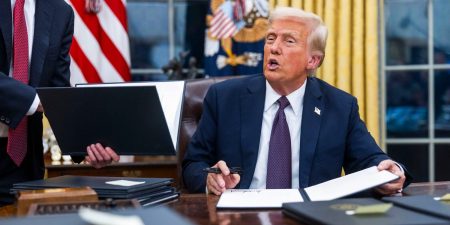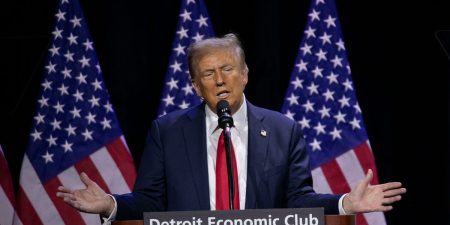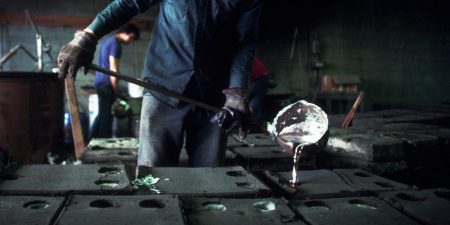The Quiet Lobbying Effort: Big Business Pushes Back Against Mass Deportations
Many of America’s largest corporations are waging a behind-the-scenes campaign to dissuade President Donald Trump from pursuing mass deportations of immigrants, who make up a significant portion of their workforce. These businesses argue that such a move would severely disrupt the economy, leading to higher prices for everyday goods and services, from food to housing. The lobbying effort, dubbed "Make America Wealthy Again" (MAWA), aims to appeal to Trump’s business instincts and the economic concerns of his administration. Industry leaders, lobbyists, and trade association officials, speaking anonymously, revealed that the campaign is targeting Trump’s allies in the administration and Republican lawmakers, rather than the president directly. They believe Trump, as a businessman, understands the importance of maintaining a robust labor force, especially in industries like agriculture, construction, and retail, which heavily rely on immigrant workers.
Targeting Trump’s Circle: A Strategic Approach to Influence Immigration Policy
The MAWA campaign is strategically avoiding direct confrontation with Trump, instead focusing on influencing his inner circle, particularly those with ties to the business community. Lobbyists are steering clear of Stephen Miller, a key architect of Trump’s hardline immigration policies, as they view him as unsympathetic to their cause. Instead, they are targeting figures like Brooke Rollins, Trump’s pick for the Department of Agriculture, and Kristi Noem, the Secretary of Homeland Security. Both Rollins and Noem have backgrounds in advocating for business interests, and lobbyists believe they can serve as moderators in the immigration debate. Additionally, the campaign is reaching out to Republican members of Congress, particularly those on key committees such as the House Agriculture Committee, chaired by Rep. Glenn Thompson of Pennsylvania. Lobbyists describe their approach as a "shock and awe" campaign, applying "1,000 points of pressure" to emphasize the economic consequences of mass deportations.
The Economic Argument: Immigrants as a Vital Workforce
At the heart of the lobbying effort is the argument that immigrants are essential to the U.S. economy, particularly in low-wage, high-risk jobs that many Americans are unwilling to take. Industries such as agriculture, meatpacking, and construction rely heavily on migrant labor, and mass deportations would create severe labor shortages, driving up costs for consumers. Cristina Antelo, a lobbyist at Ferox Strategies, which represents major clients like Walmart and the National Retail Federation, highlights the practical implications for businesses like Trump’s own golf courses: "If he doesn’t have 200 guys cutting the grass at his golf courses, then they don’t look right, and people won’t want to play golf there." This pragmatic appeal to Trump’s business sense is central to the MAWA campaign.
The Role of the US Chamber of Commerce and Other Business Groups
For years, the U.S. Chamber of Commerce, the nation’s largest lobbying group, was a vocal advocate for pro-immigration policies, recognizing the importance of migrant labor to the economy. However, as Trump made immigration a central issue of his presidency, the Chamber scaled back its public advocacy. Behind the scenes, however, the organization has continued to press lawmakers and Trump officials to avoid immigration enforcement actions that could harm big business. Other influential business associations have also joined the effort, forming what one lobbyist calls a "quiet caucus" of groups pushing for a more moderate approach to immigration. While these organizations have not commented publicly on their efforts, their lobbying operations are significant, reflecting the broader business community’s concern about the economic impact of Trump’s policies.
Hopes for Comprehensive Immigration Reform
Some lobbyists involved in the MAWA campaign believe their efforts could go beyond merely preventing mass deportations, potentially paving the way for comprehensive immigration reform. They envision a deal that would balance border security measures with business-friendly concessions, such as a pathway to citizenship for taxpaying immigrants with jobs and an expansion of work visas for seasonal laborers and high-tech workers from abroad. While the specifics of such a plan remain uncertain, lobbyists are optimistic about the possibility of negotiations, given Trump’s reputation for pragmatism. Dan McFaul, a partner at the lobbying firm Ballard Partners, which has close ties to Trump’s inner circle, summed up the guiding principle of the effort: "What is the art of the possible?"
Trump as the Ultimate Decider: Business Lobbyists’ Best Ally
Despite Trump’s hardline rhetoric on immigration, corporate lobbyists are confident that he can be persuaded to reverse course, especially if the economic stakes are made clear. "There’s one thing Trump cares more about than keeping his mass deportation promise, and that’s the economy," says one longtime corporate lobbyist. They point to Trump’s willingness to backtrack on policies when faced with opposition from the business community, such as his decision to delay a planned 25% tariff on Mexico after intense pushback from business leaders. Lobbyists view Trump himself as their best ally in reversing his most extreme immigration positions, citing his pragmatic approach to issues. As one lobbyist put it, "He’s loud, but he’s not dumb." With the MAWA campaign in full swing, the business community is betting that Trump’s commitment to economic growth will ultimately prevail over his deportation plans.












